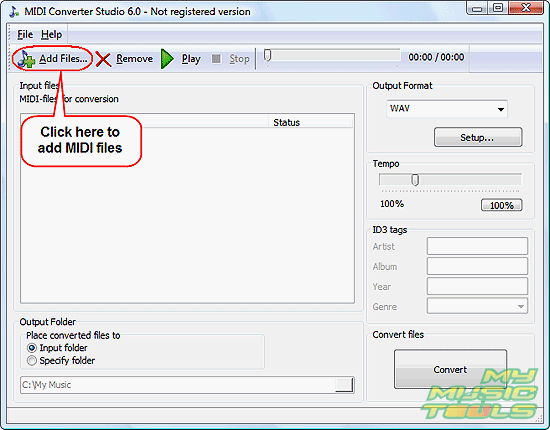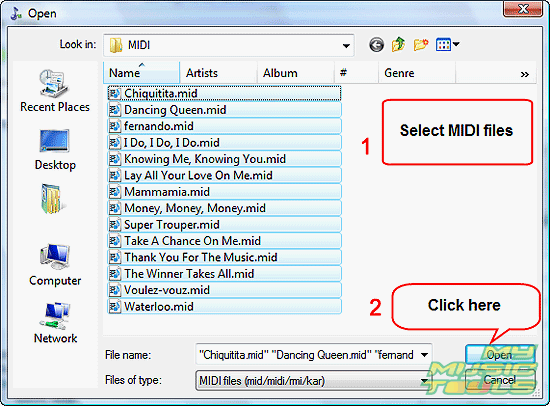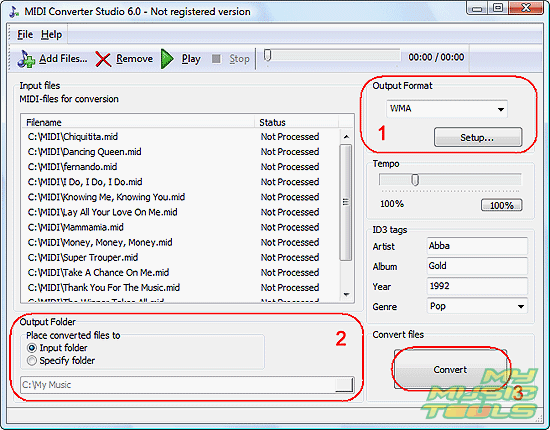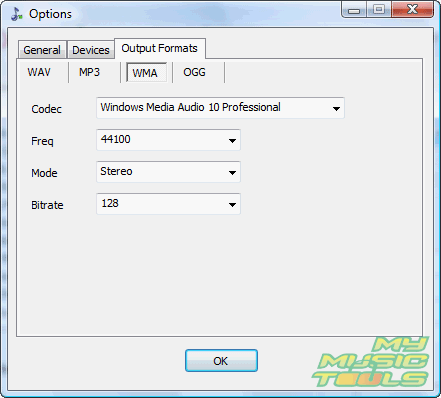How to convert MIDI to WMA?
Introduction.
Many people believe MIDI to be just another audio format, like MP3, WAV, WMA, OGG Vorbis and so on. From this point of view, converting from and to MIDI should be quite a trivial task, similar to converting from WAV to MP3 (as an example).
Now, why do WMA files sound differently if converted with different MIDI to WMA converters? Why do certain converters produce better sound than others? Why don't they convert WMA to MIDI as well?
The truth is that MIDI is not an audio format at all. MIDI stands for Musical Instruments Digital Interface, which basically means that there is a set of rules for communicating between different devices. Thus MIDI files are just messages that tell a musical instrument (synthesizer) what should be played. Consequently we need a synthesizer that would convert messages into real music. Furthermore, this process is very different from converting music into messages, as one can easily understand. The closest analogy would be playing sheet music (MIDI to WMA) and writing sheet music by ear (WMA to MIDI).
All modern sound cards have a built-in MIDI synthesizer. However, they can produce quite different sound out of the same MIDI files. Expensive sound cards tend to have better synthesizers and are capable of producing more natural sound.
But even if your sound card doesn't belong to the top class, you can get pretty good (say, top-level) MIDI output. The trick is in using a software synthesizer instead of the built-in one.
A program that can convert MIDI to WMA using a software synthesizer is MIDI Converter Studio.
Step 1: Download and install the program.
Download MIDI Converter Studio to a known location. Run the downloaded setup and follow its instructions to install the application.
Step 2: Start the program. Select MIDI files to convert.
Launch the MIDI converter. In the main window, click the leftmost button on the toolbar:

This will invoke a usual "Open" dialog. Browse to the location where your MIDI files are stored, pick out those that you want convert to WMA, click "Open":

Alternatively you can drag MIDI files from Windows Explorer or some other file manager that supports Drag&Drop and drop them into MIDI Converter Studio.
Step 3: Set output folder and format. Convert MIDI to WMA.
Your MIDI files should be shown in the conversion list now.

You can preview the files by selecting them from the list and clicking "Play" on the toolbar. To stop playing, click "Stop".
In the "Output format" area (1), select WMA from the dropdown list. Additionally you can adjust bitrate and other settings by clicking the "Setup" button in the same area:

However, default settings are good for most cases.
MIDI Converter Studio automatically detects and selects installed codec. If you want to experiment with different codecs, you may need to install them.
Click "OK" to close the settings window and to return to the main window.
In the "Output folder" area, select a folder where converted WMA files should be saved. You can use either the same folder where your input files are (if input files are in different folders, converted WMA files will be sorted correspondingly), or any other folder on your computer. Make sure that you have necessary permissions on the folder.
Optionally you can fill out the WMA tag fields information (for example, if all files are from the same album, or should be marked as such).
Finally, click the big "Convert" button (3). The program starts converting MIDI to WMA. You can cancel the process any time by clicking the same big button (it becomes "Stop").
The trial version of MIDI Converter Studio can convert only 60 seconds of each file. If you are satisfied with the quality and features, you can register your copy and remove all limitations.
Search
Related
- How to convert multiple MIDI files into an MP3?
- How to play MIDIs on an iPhone?
- Play MIDI files on your iPod!
- How do I convert MIDI to WAV?
- How to convert MIDI to OGG?
- How to convert MIDI to WAV?
- How to convert MIDI to CDA?
- How to convert MIDI to MP3 using several SoundFonts?
- How to convert MIDI to WMA?
 How to convert MIDI to MP3
How to convert MIDI to MP3- MIDI to MP3 converter with ID3 tags support
- MIDI to Ringtone Converter
- How do I convert KAR to MP3?
- How do I convert MIDI to MP3?
- Fast MIDI to MP3 Converter 5.6 review
- How to convert a mid to mp3?
- ManiacTools Releases MIDI Converter Studio 4.6
- How do I edit MIDI files?
- WIDI Recognition System Professional 3.3 Review
- How do I convert MP3 to MIDI?
- Able MIDI Editor 1.3 review
Ask our expert
- How to share screen videos online?
- How to sort duplicate music files by ID3 tags?
- How to get quick updates on movies by director?
- How to convert multiple MIDI files into an MP3?
- How to rotate videos?
- How to convert WMA to WAV?
- How to play MIDIs on an iPhone?
- How to split an audio file into equal parts?
- How to split m4b audiobooks into chapters for free?
- How to convert videos for You Tube?



